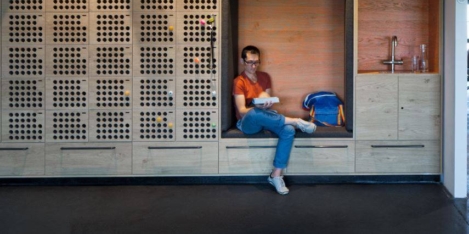April 25, 2019
Lies about work, the limits of wellness programmes, sleepwalking architects and some other shoes
 There are lots of reasons to worry about where the World might be taking us, or perhaps where we are taking it. You can take your pick but for me one of the most worrying aspects of contemporary discourse is the obvious dearth of empathy. We might like to think of this as an innate characteristic of human beings, but it really isn’t. It’s something that we also need to learn. This idea is explored in this piece by Hanna Rosin who centres her argument around an analysis by Sara Konrath, an associate professor and researcher at Indiana University who has discovered that our willingness to empathise with people is eroding rapidly, especially for those who we see as ‘other’ or irrelevant. If you want an example of lack of empathy, you can see it in this footage of a banker being taken to task for it in a US committee hearing.
There are lots of reasons to worry about where the World might be taking us, or perhaps where we are taking it. You can take your pick but for me one of the most worrying aspects of contemporary discourse is the obvious dearth of empathy. We might like to think of this as an innate characteristic of human beings, but it really isn’t. It’s something that we also need to learn. This idea is explored in this piece by Hanna Rosin who centres her argument around an analysis by Sara Konrath, an associate professor and researcher at Indiana University who has discovered that our willingness to empathise with people is eroding rapidly, especially for those who we see as ‘other’ or irrelevant. If you want an example of lack of empathy, you can see it in this footage of a banker being taken to task for it in a US committee hearing.













 Not-for-profit, wellbeing provider Westfield Health has launched an online initiative to support workplace health and wellbeing which will educate employers across the UK on how they can make a positive difference within their organisation. With over half (54 percent) of businesses reporting that they don’t have any measures in place to support the health and wellbeing of their staff,
Not-for-profit, wellbeing provider Westfield Health has launched an online initiative to support workplace health and wellbeing which will educate employers across the UK on how they can make a positive difference within their organisation. With over half (54 percent) of businesses reporting that they don’t have any measures in place to support the health and wellbeing of their staff, 






 Workers in the UK are putting the longest hours in the EU, according to a new
Workers in the UK are putting the longest hours in the EU, according to a new 


 UK-based
UK-based 










April 24, 2019
The meteor strike of coworking and the beasts that will remain
by Mark Eltringham • Comment, Flexible working, Property, Workplace design
(more…)